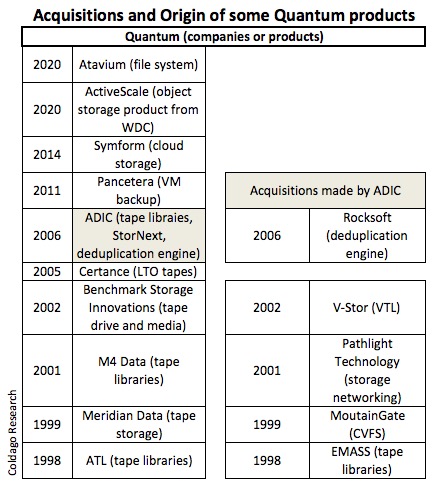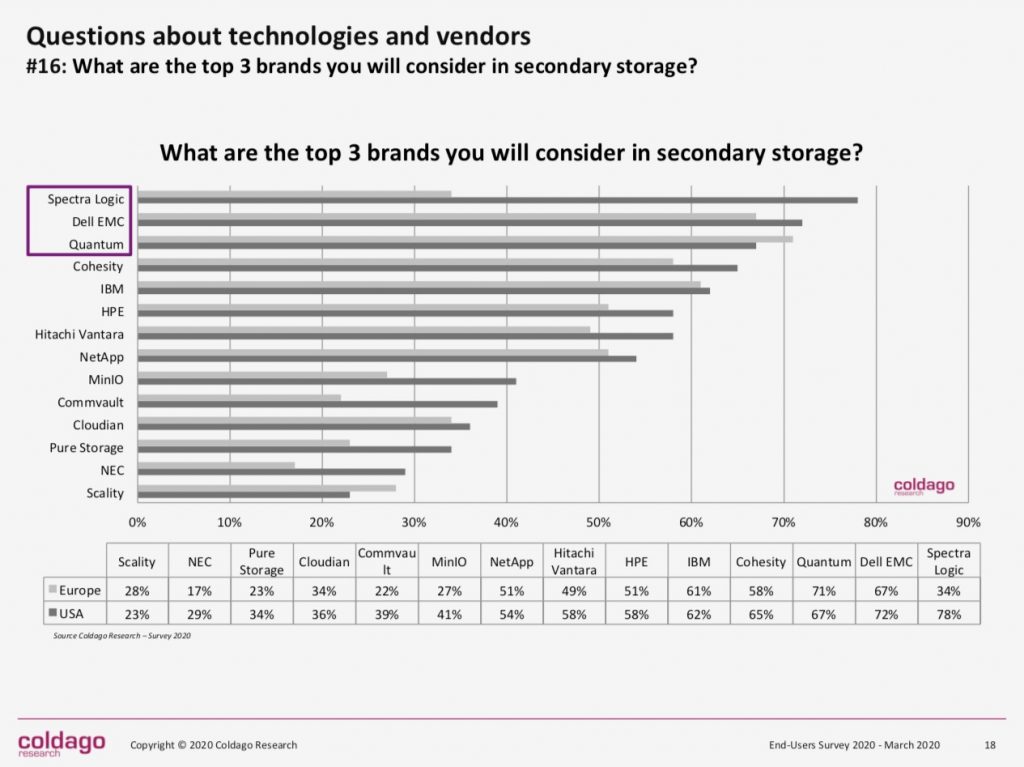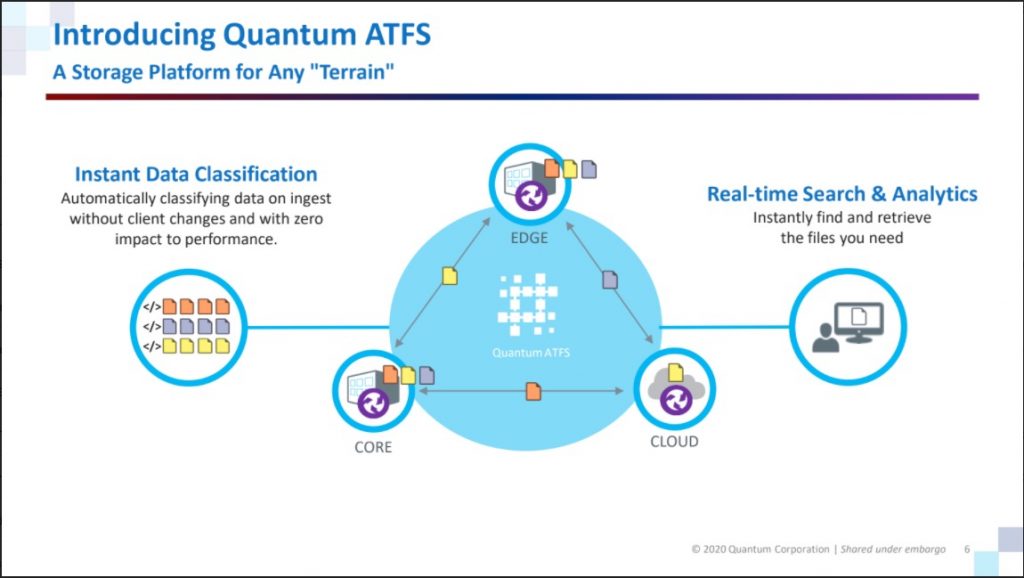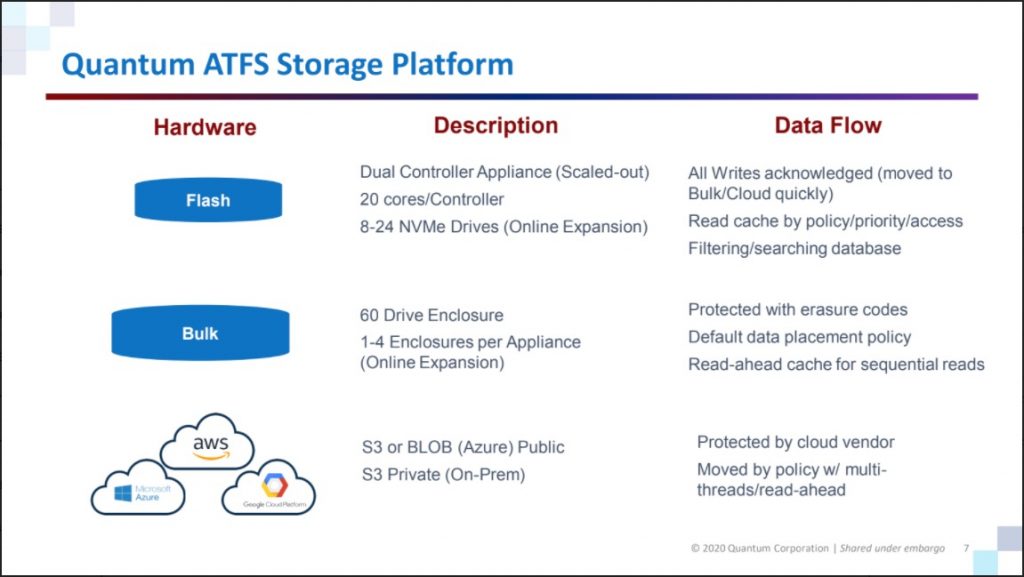Quantum Expands Portfolio
To classify, manage and protect video and unstructured data across lifecycle
This is a Press Release edited by StorageNewsletter.com on November 11, 2020 at 2:21 pmQuantum Corp. unveiled an expansion of its solutions portfolio to help customers classify, manage and protect video and unstructured data across its lifecycle.
Addressing the need to manage data end to end – on premise or in the cloud – is another step in company’s strategy to provide management and storage services for unstructured data.
The expanded portfolio includes:
- ATFS – a next gen software platform with integrated data classification enabling new ways to visualize, automate, and purposefully place data in the right place, at the right time.
- StorNext 7 File System – the latest version of firm’s high-performance file system, now with new ways to automate data placement on NVMe for high-throughput, low latency workloads.
- ActiveScale Object Storage – ActiveScale line is expanded with a smaller capacity 3-node object storage system, along with new features such as object lock to protect critical data.
These new solutions will be introduced prior to Quantum’s VirtualQ I Transform events, November 17 and 19, and will be available via a software subscription license based on capacity, demonstrating company’s commitment to delivering unstructured data solutions with purchasing and deployment options that align to organizations’ needs.
Helping Customers Unlock Business Value of Unstructured Data
Accelerated data growth, lack of visibility and control over data, and more data movement are contributing to organizations’ challenges of managing unstructured data sprawl and harnessing the value that is in this unstructured data. Advancements in AI and analytics are driving new lifecycle requirements, including the need to ensure data accessibility for decades and beyond, and protecting against data loss, disaster and cyber attacks. By managing data across its lifecycle, the vendor is empowering customers to navigate the new data landscape and manage data and storage for greater productivity and efficiency.
Ashish Nadkarni, GVP, infrastructure systems, platforms and technologies, IDC, said: “Massive unstructured data growth may be the defining factor for industries and economies of the 21st century. This data lives everywhere – it is created and processed at the edge, moved to both the cloud and the core data center, and stored and protected in multiple locations. Quantum is offering the tools to help companies retain and protect this valuable data for decades, with the ability to easily search and access it for future analysis.”
Lance Hukill, VP sales, Chesapeake Systems, Inc., said: “Quantum is delivering a smarter management approach for unstructured data, which is emerging as a defining challenge across a range of businesses. Quantum is also aligning its licensing methodology with where customers see value and how best to procure necessary resources.”
Jamie Lerner, president and CEO, Quantum, comments: “Our customers are dealing with massive video and unstructured data growth, and it will be the ability to harness the value of this data – to ‘enrich’ this data – that will drive businesses forward. This is what will drive the next discovery, the next innovation, new ways to communicate and entertain, and new business models. We’re focusing our innovation on helping customers unlock the value in their video and unstructured data in new ways to solve their most pressing business challenges, and this expanded portfolio is an important step toward enabling that model.”
Quantum will host VirtualQ | Transform, an online forum for unlocking the value of unstructured data, November 17 in Europe, and November 19 in North America. The company will showcase the latest offerings to capture, store, manage, protect, and archive unstructured data in all its forms. Participants will gain industry perspectives on the forces and trends shaping the company’s technology roadmap and get access to Quantum executives, as well as product and technical leaders.
Comments
Quantum is well known for StorNext, its file storage offering, and a bit less for ActiveScale, as the product landed recently coming from WDC. Lattus, the former object storage line, came from the same Amplidata foundation through an OEM agreement with WDC.
The company is historically a good example of the Build, Buy or Partner strategy essentially with the Buy aspect of it as many of their past and current products come from acquisitions. The team has a real talent to identify technologies pushed by time to market pressure. Among them, the firm finally decided to acquire ADIC that changed radically its destiny with StorNext - formerly CentraVision File System - and DXi coming from Rocksoft, two recognized, adopted and well respected product lines.
The list below illustrates its M&A journey:

This strategy confirms the secondary storage role of Quantum seen by end-users as one of the worldwide leaders. Coldago Research has published early this year an end-user survey that illustrates this perception.
Click to enlarge
ATFS first means All-Terrain File System and not Atavium File System nor Storage even if it could work. This word really means that the product can be used in many various use cases being scalable and rock solid in term of data protection. ATFS comes from Atavium acquired early this year - we wrote already about this move 2 posts (1 and 2) in September. 2017 and April 2020.
Quantum has recognized its lack of real NAS capabilities with StorNext. You don't select StorNext to provide NAS access but for intense file IO/s with some potential minor NAS usages, this is very different. Exposing NFS or SMB is not enough to be a real NAS. So the company needed to react and again has to choose between Build, Buy or Partner. The decision was made with Atavium acquisition.
But ATFS goes beyond NAS, first it's scale out, secondly it's about data services with advanced erasure coding, NVMe and SMR drives, multi-layer data placement, cloud integration and file classification among many characteristics.
Click to enlarge
The first consideration for some years now is the impossibility to index a posteriori data with the huge volume it represents. It has to be done differently.
Therefore the product introduces interesting concepts such as classification on ingest with intelligent tagging. Immediately we understand that ATFS sits in the data path being a scalable file server and constitutes the gate to a realm of virtualized storage entities.
The storage layer groups multiple layers, a fast write mirrored cache with up to 24 NVMe drives. Then the second level is built with 60 SMR drives with up to 4 JBOD enclosures. NVMe drives can be added by increment of 2 and SMR by increments of 6. Data is protected with erasure coding in 14:2 scheme. Then the last level is the cloud - Azure, GCP or AWS - with its own protection and data placement techniques or object storage entities such ActiveScale.
Metadata structure follows the topology of the cluster with the utilization of MongoDB and for search, ATFS implements Elasticsearch, meaning that Atavium, now Quantum, adopts recognized and proven open source products and don't reinvent the wheel.
In terms of interfaces, the front-end used by client machines exposes NFS and SMB and the back-ends adds S3 to these two protocols. A client can see and access the same content via NFS and SMB. But the product also offers an API for better application integration and affinity.
Click to enlarge
The storage firm strengthens its positioning with 3 products and creates a real portfolio differentiator with players having just 2 or 2 similar solutions.
ATFS marks a new era for Quantum being a real product line as the 2 others already exist and are more product iterations. Now we'll wait ATFS adoption and next features and product iterations.
















 Subscribe to our free daily newsletter
Subscribe to our free daily newsletter

